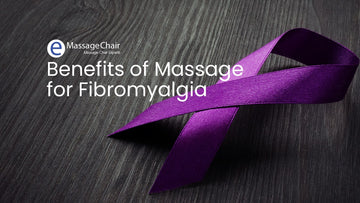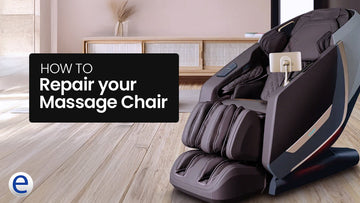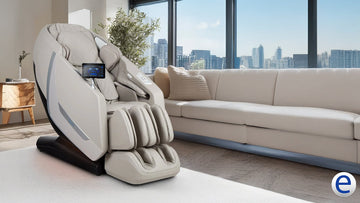If you have fibromyalgia, you may be wondering if massage can help alleviate some of your symptoms. In this article, we'll explore the research on massage and fibromyalgia to help you make an informed decision, but first, what is Fibromyalgia?
Table of Contents
What is Fibromyalgia?
Fibromyalgia is a chronic disorder characterized by widespread musculoskeletal pain, tenderness, and fatigue. The condition is often accompanied by other symptoms such as sleep disturbances, depression, and cognitive impairment. Fibromyalgia is a complex condition that is not fully understood, and the exact cause is not known. However, researchers believe that it may be caused by a combination of genetic, environmental, and psychological factors.
Fibromyalgia is often difficult to diagnose because its symptoms are similar to those of other conditions. It is typically diagnosed based on the presence of widespread pain and tenderness in at least 11 of 18 specific tender points on the body, as well as the exclusion of other conditions that could be causing the pain.
However, various treatments, such as medication, exercise, and cognitive behavioral therapy, can help manage the symptoms. Massage therapy is another treatment that may be beneficial for people with fibromyalgia.
What are the symptoms of Fibromyalgia?
Symptoms of fibromyalgia can vary from person to person, and may include:
- Widespread pain and tenderness in the muscles and soft tissues
- Fatigue and sleep disturbances
- Depression and anxiety
- Cognitive impairment (also known as "fibro fog")
- Headaches and migraines
- Irritable bowel syndrome (IBS)
- Temporomandibular joint disorder (TMJ)
Is there a cure for Fibromyalgia?
There is no cure for fibromyalgia, but various treatments can help manage the symptoms. Treatment options may include medication, exercise, cognitive behavioral therapy, and massage therapy. However, as fibromyalgia is a complex condition and treatment response is highly individual, it's important to work with healthcare professional to find the best treatment plan.
Can massage therapy help with Fibromyalgia?
It's important to note that massage therapy should not be used as a substitute for other treatments for fibromyalgia. Instead, it should be used in conjunction with other treatments, such as medication, exercise, and cognitive behavioral therapy, to provide the best results.
Research has shown that massage can help reduce pain and improve function in people with fibromyalgia. A study published in the Journal of Clinical Rheumatology (1) found that massage therapy was effective in reducing pain, improving sleep, and increasing range of motion in people with fibromyalgia. Another study published in the Journal of Pain (2) found that massage therapy was effective in reducing pain, improving mood, and increasing physical function in people with fibromyalgia.
It's important to note that not all types of massage are the same, and some may be more effective than others for fibromyalgia. For example, research suggests that Swedish massage, which uses long strokes, kneading, and other techniques to relax the muscles, may be more effective than other types of massage for fibromyalgia. Deep tissue massage, which uses firm pressure to reach the deeper layers of muscle, may also be beneficial, although it may be too intense for some people.
What are the benefits of massage for Fibromyalgia?
Massage therapy may provide a number of benefits for people with fibromyalgia, including:
- Pain relief: Research has shown that massage therapy can help reduce pain in people with fibromyalgia. Studies have found that massage therapy can help to alleviate muscle pain and tension, which can help to reduce overall pain levels.
- Improved function: Massage therapy may also improve function in people with fibromyalgia. Studies have found that massage therapy can help to improve range of motion and flexibility, which can help to improve overall physical function.
- Improved sleep: People with fibromyalgia often experience sleep disturbances, massage therapy may help to improve the quality and duration of sleep, as it can help to relax the body and reduce muscle pain and tension.
- Reduced stress and anxiety: Massage therapy can also help to reduce stress and anxiety levels in people with fibromyalgia. It can help to promote relaxation, which can help to reduce overall stress and anxiety levels.
- Improved mood: Massage therapy has been shown to improve mood in people with fibromyalgia. Studies have found that massage therapy can help to improve overall mood and reduce symptoms of depression.
Can a massage chair help with Fibromyalgia?
The short answer is Yes. A massage chair may provide the following benefits for people with fibromyalgia:
- Pain relief: The massage function of a chair can help to alleviate muscle pain and stiffness caused by fibromyalgia.
- Improved circulation: The massage can also increase blood flow, which can help to reduce inflammation and improve overall muscle function.
- Relaxation: Massage chairs can also help to relax the muscles and reduce stress, which can help to improve overall symptoms of fibromyalgia.
- Convenience: Massage chairs can be used at home, which may be more convenient than going to a massage therapist.
Conclusion
In conclusion, massage therapy and massage chairs may be beneficial for people with fibromyalgia as it can help reduce pain and improve function. However, it's important to remember that fibromyalgia is a complex condition and massage should not be used as a substitute for other treatments. It's always best to consult with a doctor or therapist before starting massage therapy for fibromyalgia.
References:
- National Institute of Arthritis and Musculoskeletal and Skin Diseases (NIAMS). (2021). Fibromyalgia.
- American College of Rheumatology. (2020). Fibromyalgia.
- Mayo Clinic. (2021). Fibromyalgia.
- (1) Field, T., Hernandez-Reif, M., LaGreca, A., Shaw, K., Schanberg, S., Kuhn, C., & Burman, I. (2005). Massage therapy research review. Journal of Clinical Rheumatology, 11(1), 17-24.
- (2) Hernandez-Reif, M., Field, T., Krasnegor, J., Theakston, H., Hossain, Z., & Burman, I. (2001). Fibromyalgia pain and substance P decrease, and sleep improves after massage therapy. Journal of Pain, 2(3), 126-130.





